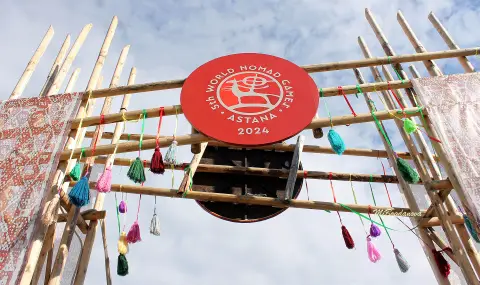It is not every day that one gets the opportunity to make a strong connection between sport on the one hand, culture and tourism on the other, and the unification of nations on the third. This year, however, Kazakhstan had this unique chance thanks to its hosting of the 5th Nomad Games. The event – equivalent of the Olympic Games, which were recently held in Paris, not only took the participants and spectators back centuries to the history and ancient culture of our forefathers, but was also an excellent advertisement for the country, as well as a unique opportunity to prove once again that despite the conflicts , witnessed in recent years, nations can be united.
How do you organize a sporting event like this that brings together the best players in nomadic sports from 89 countries around the world?
Creativity, synchronization between institutions, excellent organization and many, indeed many volunteers.
The capital Astana, which hosted this year's edition of the Nomad Games, was literally branded from end to end with the event's logo, which features the two dolls – a girl and a boy dressed in typical Kazakh costumes – public transport buses, taxis and other public places.


Innovative Games advertising welcomes participants traveling to one of the world's most significant sporting events long before they set foot on Kazakh soil. As soon as you board the Air Astana plane, the mandatory travel safety video is presented in an intriguing way precisely through the nomadic games, interweaving elements of the natural attractions of the ninth largest country in the world.
What is the arena where the games were held?
The main stage where the Games were held was the ethno-aul "Universe of Nomads", located on an area of 10,000 hectares near the "Kazanat" hippodrome, about a 20-minute drive from the center of Astana. Equestrian competitions, archery, bird hunting were held there, as well as cultural events in which nearly 3,000 dancers and singers from all regions of Kazakhstan took part.
In the ethnoaul one could buy handmade typical Kazakh art objects, costumes, ornaments, and of course, try the traditional Kazakh cuisine and all this served in an unforgettable way with lots of taste, beautiful colors and lots of smiling people .
Who are the winners?
Over 2,000 competitors from 89 countries took part in the 5th Nomad Games. However, looking at the table of medals, it can be concluded that nomadic blood flows in the veins of Kazakhs, Kyrgyz, Russians and Uzbeks. And Europe, America and Africa are still far from the achievements of Asia. At the past Games, Kazakhstan won 112 medals. Kyrgyzstan and Russia took home 65 and 49 medals, respectively, and Uzbekistan – 34.
How is a link between sport, tourism and culture successfully realized?
The 5th Nomad Games were the only realized of the biggest international events that Kazakhstan was supposed to host this year. The floods that inundated the country in April were some of the worst in 80 years. This led the state to change its plans by postponing all major events with global participation and diverting funds to help those affected by them. It left only the implementation of the Games of the Nomads – perhaps to send us even just for a few days into the distant past of our ancestors, to remind us where we come from and above all to show us the deep connection of man with nature.
The 5th Games of the Nomads was an excellent advertisement of Kazakhstan not only in the Asian region, but also in the whole world. The ninth largest country in the world has shown its commitment to protect and develop nomadic sports and preserved centuries-old traditions on the one hand, and on the other – to strengthen diplomatic and cultural ties with its neighbors.
Thanks to the Games, the world saw the dynamic development of the country not only in sports, but also in cultural and economic terms. Kazakhstan was undeniably able to derive commercial and tourism benefits from the Games in addition to their cultural significance. Audiences from around the world were given a chance to witness the nation's natural beauty, hospitality and cultural attractions as the event highlighted the nation's tourism potential. Kazakhstan took the opportunity to promote its tourism sector and attract foreign visitors, thanks to the countless cultural events and exhibitions organized during the sporting event, and this undoubtedly helped the country's further economic development and progress.
The tradition of preserving nomadic games continues. After two years – in 2026, the host will be Kyrgyzstan.






































